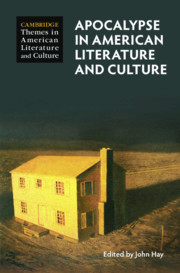Book contents
- Apocalypse in American Literature and Culture
- Cambridge Themes in American Literature and Culture
- Apocalypse in American Literature and Culture
- Copyright page
- Contents
- Figures
- Contributors
- Introduction The United States of Apocalypse
- Part I America as Apocalypse
- Part II American Apocalypse in (and out of) History
- Chapter 5 The Puritans Prepare for the Second Coming
- Chapter 6 The American Revolution as Extinction and Rebirth
- Chapter 7 Race, American Enlightenment, and the End Times
- Chapter 8 Sentimental Premonitions and Antebellum Spectacle
- Chapter 9 Antebellum Anticipations of Annihilation
- Chapter 10 The Apocalyptic Fury of the Civil War
- Chapter 11 Apocalyptic Form in the American Fin de Siècle
- Chapter 12 The Ruins of American Modernism
- Chapter 13 Mutually Assured Destruction in Cold War/Postwar America
- Chapter 14 Postmodern American Literature at the End of History
- Chapter 15 Ecology, Ethics, and the Apocalyptic Lyric in Recent American Poetry
- Chapter 16 Disaster Response in Post-2000 American Apocalyptic Fiction
- Part III Varieties of Apocalyptic Experience
- Further Reading
- Index
Chapter 9 - Antebellum Anticipations of Annihilation
from Part II - American Apocalypse in (and out of) History
Published online by Cambridge University Press: 03 December 2020
- Apocalypse in American Literature and Culture
- Cambridge Themes in American Literature and Culture
- Apocalypse in American Literature and Culture
- Copyright page
- Contents
- Figures
- Contributors
- Introduction The United States of Apocalypse
- Part I America as Apocalypse
- Part II American Apocalypse in (and out of) History
- Chapter 5 The Puritans Prepare for the Second Coming
- Chapter 6 The American Revolution as Extinction and Rebirth
- Chapter 7 Race, American Enlightenment, and the End Times
- Chapter 8 Sentimental Premonitions and Antebellum Spectacle
- Chapter 9 Antebellum Anticipations of Annihilation
- Chapter 10 The Apocalyptic Fury of the Civil War
- Chapter 11 Apocalyptic Form in the American Fin de Siècle
- Chapter 12 The Ruins of American Modernism
- Chapter 13 Mutually Assured Destruction in Cold War/Postwar America
- Chapter 14 Postmodern American Literature at the End of History
- Chapter 15 Ecology, Ethics, and the Apocalyptic Lyric in Recent American Poetry
- Chapter 16 Disaster Response in Post-2000 American Apocalyptic Fiction
- Part III Varieties of Apocalyptic Experience
- Further Reading
- Index
Summary
“The slaveholders,” Frederick Douglass said in 1849, “are sleeping on slumbering volcanoes.” American readers in the 1850s were captivated by such apocalyptic imagery. As the crisis over slavery developed—from the Fugitive Slave Act (1850) to the Kansas–Nebraska Act (1854) to the Dred Scott decision (1857)—many became increasingly convinced that their world would, like Pompeii in the first century, come to a fiery, apocalyptic end. But debates arose about how and why the United States might come to an end and whether this end could be prevented. While abolitionist writers often described slavery as a sin, others thought of slavery as a national pathology that might be cured or, at the very least, managed. This chapter explores the apocalyptic dimensions of the period that has long been called the American Renaissance.
Keywords
- Type
- Chapter
- Information
- Apocalypse in American Literature and Culture , pp. 122 - 133Publisher: Cambridge University PressPrint publication year: 2020



